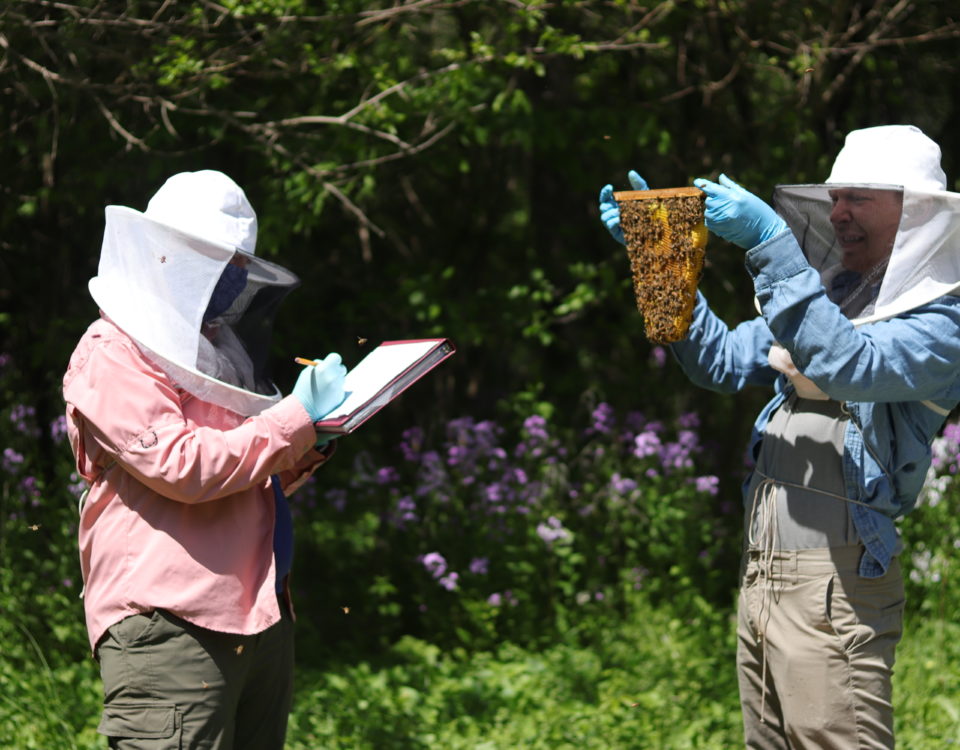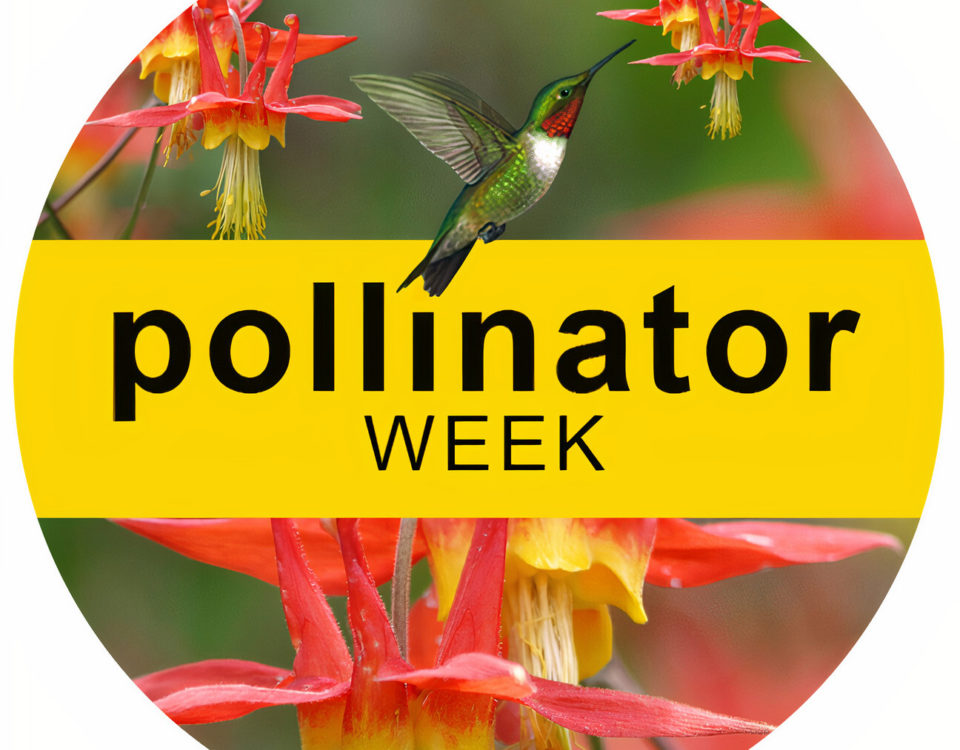- All-In-One Beekeeping for the Bees
- +1-608-728-8233
- info@beepods.com
This Spring, Don’t Forget Why Bees Are So Important to Our Environment
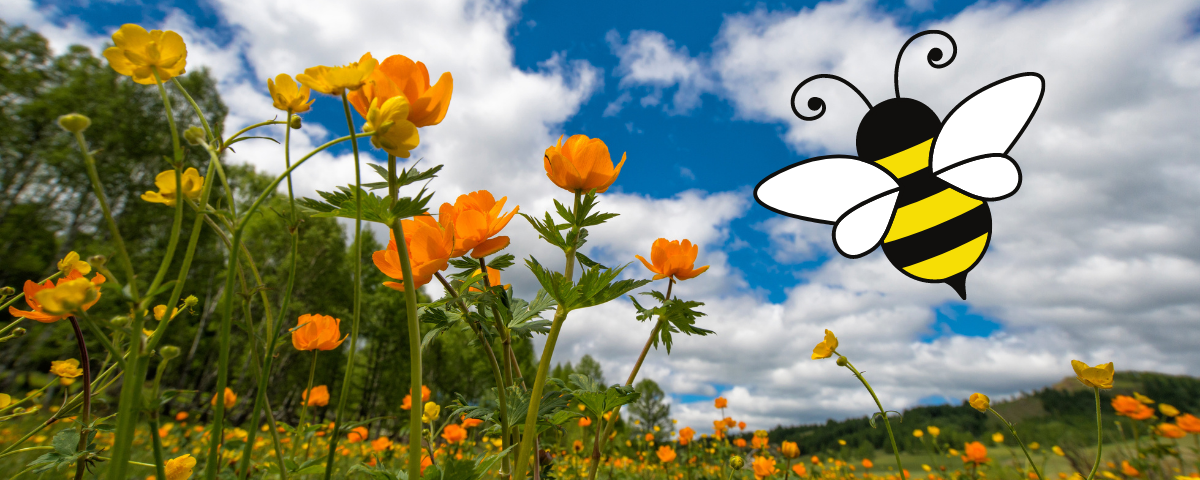
We’re finally getting a taste of the warmer temperatures spring brings us. Before we know it, we’ll be adventuring outdoors in the sunshine again and enjoying all the activities and hobbies we missed during the cold winter months. As you make plans for the fun things you’ll be doing in the sunshine and fresh air, don’t forget how important our favorite pollinators are to our environment.
Those leisurely walks through your local park’s flower beds, camping trips in the woods, and warm evenings spent in your backyard garden? We get to enjoy those beautiful settings and scenery thanks to bees.
Bees are responsible for so much of what makes us appreciate the outdoors! Here is a list of the top three reasons bees are so important to our environment. Keep them in mind as you head outside this spring!
Bees are Pollinating Powerhouses
Bees and a ton of other small creatures like hummingbirds, flies, moths, geckos, and bats (yep, bats!) all contribute to the pollinating that keep flowering plants and crops growing. With the rise in popularity of beekeeping in recent years, and an increasing awareness of pollinators’ importance, most people have at least heard about pollination.
But, do you understand what the process entails?
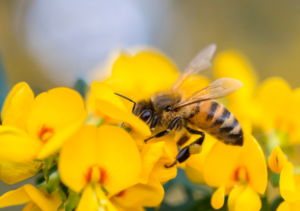
A busy honey bee dives face-first into a flower, likely sipping nectar.
In simple terms, bees and other pollinators help plants – from wildflowers to fruits and vegetables – reproduce. Bees, in particular, slurp up nectar and collect pollen from flowering plants, and pollen collects on their legs. As they flit from flower to flower, some of that pollen makes its way to the flower’s stigma.
This kicks off the plant’s reproductive cycle, allowing for fertilization and the development of seeds. That, my friends, is pollination in a nutshell. And without our pollinators, the world’s plant life would look much different.
Flowering Plants
As you’re out enjoying a sunny day this spring, taking in the sights and admiring colorful flower blossoms everywhere, remember that we have bees to thank for their beauty. Through pollination, bees support the growth of your favorite flowers, whether they grow on hillsides or in your backyard.
Interested in setting up your own pollinator garden full of bee-friendly flowers? Check out our Sustainable Gardening 101 course in Beepods Lab, our members area. It covers important steps ranging from developing a sustainable mindset and pollinator garden costs to garden design and planting!
Crops
Bees’ pollinating powers are especially important when it comes to crop production that supports our agriculture system. In fact, “According to the United Nations Environment Program, of the 100 crop varieties that provide 90% of the world’s food, 71 are pollinated by bees.” They also contribute about $125 billion to the global agriculture industry.
Some farmers will pay top dollar to utilize bees’ pollinating services. It’s a controversial practice, but farmers will hire beekeepers to deliver their bees (sometimes across several states) to their farms and rent them. This has become an especially popular way of supporting the almond groves in California, where annually, many beekeepers bring their bees and receive hefty payouts for their pollination.
Bees and Trees Support Each Other
Planning a hike through the trees in a park or nature preserve near you? If you find yourself exploring a forest area, look for bees! Did you know they love the woods?
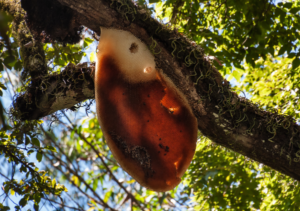
Bees find shelter high in the trees, away from predators and the elements.
Around the world, honeybees enjoy foraging the flowering trees found within forests. In fact, when given the choice of where to build hives and nests, honeybees and stingless bees alike will pick a tall tree. Trees provide bees with safe spots for their nests and, in return, bees do for them what they do best: pollinate!
Bees play an important role in helping forests thrive. The trees in forests where beekeepers have set up hives experience better regeneration. That means bees pollinating those flowering forest trees improves the growth of new seedlings. Plus, bees encourage biodiversity, which is essential to the success of forest ecosystems.
Studies have also shown that forestry and beekeeping can be a powerful and environmentally sustainable combination. In areas where forest owners have smaller acreage properties, beekeeping provides opportunities to earn more money with honeybee products (think honey, honeycomb, propolis, etc.) without having to harvest all of their trees.
If you have wooded property and are considering keeping bees near it, just be sure to plan for the right spot. Sure, your bees will love having access to all of the trees, but it’s important to select a spot that has the right conditions for bees. Grab a copy of our Bee Yard Setup and Siting Blueprint to learn everything you need to know about finding the right home for your hives.
Bees Are Key to Biodiversity
Every single plant and animal species on our planet has a role in our ecosystem. As I mentioned above, honeybees and other pollinators support tree, flower, and other plant growth. They also make it possible for those plants to provide food to humans and other animals.
We can thank bees for the role they play in promoting plant diversity, because some plants, like squash or sunflowers, are only pollinated by very specific bee breeds. Without bees, those plants would cease to exist. Bees also support diversity in wildlife around the world by keeping the bottom of the food chain fed, which in turn, supports carnivore diets.
Essentially, bees and other pollinators are critical to life on our planet.
The World of Pollinators is a fantastic activity in Beepods Lab that you can do with your kids! It teaches you about all the different pollinators, why they’re important, and their favorite plants. The activity would be a fun one to take with you on a nature walk and point out what pollinators might enjoy certain flowers!
Conclusion
At Beepods, we could go on for days about all ways bees make life on this planet better. In the spring, especially, as we return outdoors and soak up all that nature has to offer, remember our bees. Without them, so many of the amazing experiences we have enjoying our natural environments would not be possible.
Kanoe Riedel
Latest posts by Kanoe Riedel (see all)
- This Spring, Don’t Forget Why Bees Are So Important to Our Environment - March 26, 2021
- 11 Awesome Uses for Your Stored Honeycomb - March 2, 2021
- How the Right Beekeeping Equipment Makes Inspections Better for Beekeepers and Bees - February 12, 2021

